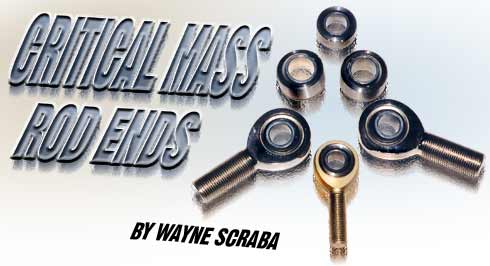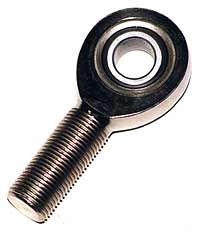|

Part 1
6/7/04
Inside today’s
drag cars, you’ll find all sorts
of rod ends or spherical bearings. Rod ends,
or as the Brits sometimes call them, “rose
joints,” happen to be one group of components
that get little or no respect. They all look
the same (sort of), and when they’re buried
deep inside of a car, they’re out of sight
and out of mind. However, rod ends may be one
of the most critical hardware pieces on your
drag car. And yes, they see use in places other
than the suspension. For example, rod ends are
used in the carburetor linkage. Because they’re
not a high profile component, they’re very
easy to forget about. Until they break.
When a rod end breaks, things can get ugly.
Fast. You see, most rod ends are regularly used
in places where they’re charged with handling
considerable loads. Rod ends are more than important.
They’re critical. And there’s something
even more acute: Not all rod ends have been
created equal. Some are true aerospace quality.
Others are nothing more than junk. Where it
becomes really confusing is when you look at
a rod end. It’s difficult to tell the difference
between an extreme quality rod end and one that
just fell off the boat from some sweat shop
in the Eastern hemisphere.
 When
shopping for rod ends for a racecar, look for
models like this. They’re a three-piece
precision design. In rod ends with this construction
format, the race is formed around the ball and
then the race insert is staked into the body.
This type of construction offers a much closer
fit along with a much higher degree of precision
between the ball and the race. Because of the
three-piece design, different materials can
be embodied during construction. This process
allows the rod end to best match the application
(i.e.: strength versus loads). When
shopping for rod ends for a racecar, look for
models like this. They’re a three-piece
precision design. In rod ends with this construction
format, the race is formed around the ball and
then the race insert is staked into the body.
This type of construction offers a much closer
fit along with a much higher degree of precision
between the ball and the race. Because of the
three-piece design, different materials can
be embodied during construction. This process
allows the rod end to best match the application
(i.e.: strength versus loads).
The Rudiments Of Rod Ends
By design, a rod end basically consists of
a spherical ball that is designed to rotate
inside a housing. This ball is the bearing and
the housing it’s contained in is the race.
The spherical ball is machined flat on each
side, and this modified “sphere” is
bored with a hole through the center.

There’s something you
really can’t see here. Rod ends are usually
available with left or right hand threads. That
means that for an application such as a trailing
link, you simply order the appropriate bearing
(be careful—some of the part numbers listed
in rod end catalogs are at the best, confusing
when it comes to thread types). There’s
another thing to consider: Be careful when purchasing
jam nuts. They’re not all created equal
either. Quite frankly, the A-N or aircraft hardware
industry is plagued with inferior knock-off
components. And like inferior rod ends, some
of this stuff is absolute junk.

|